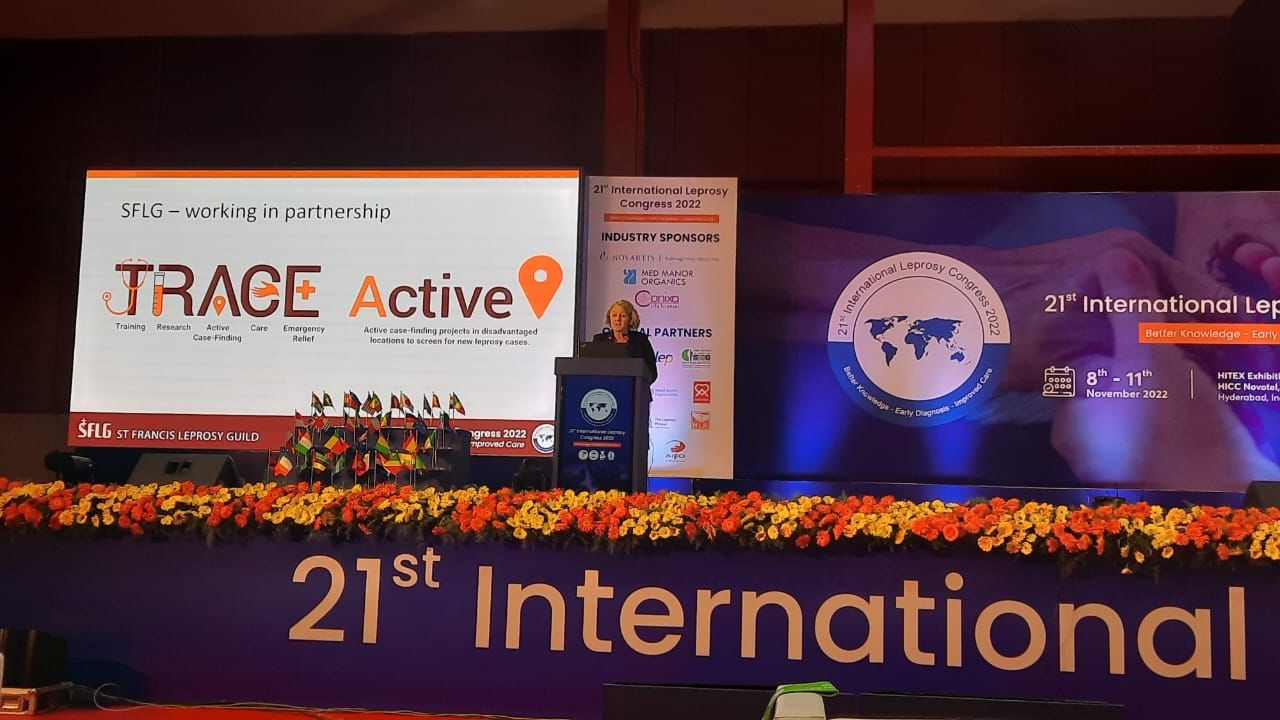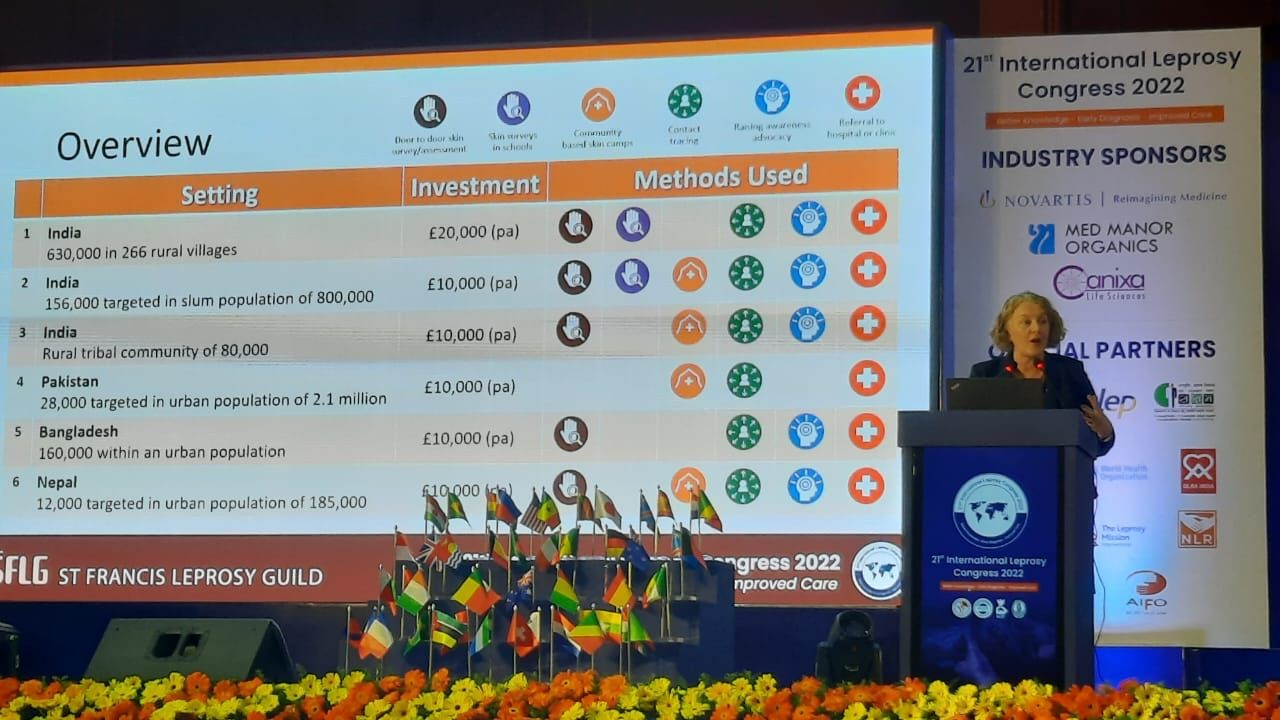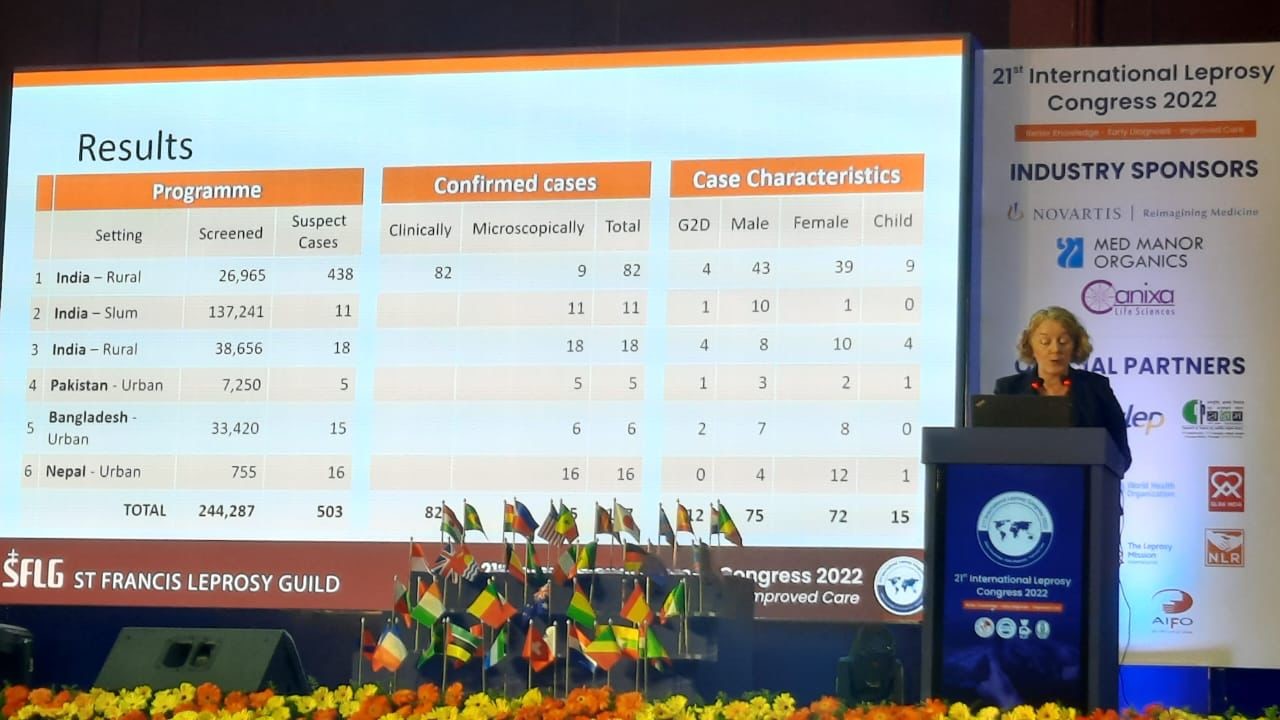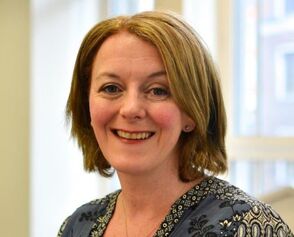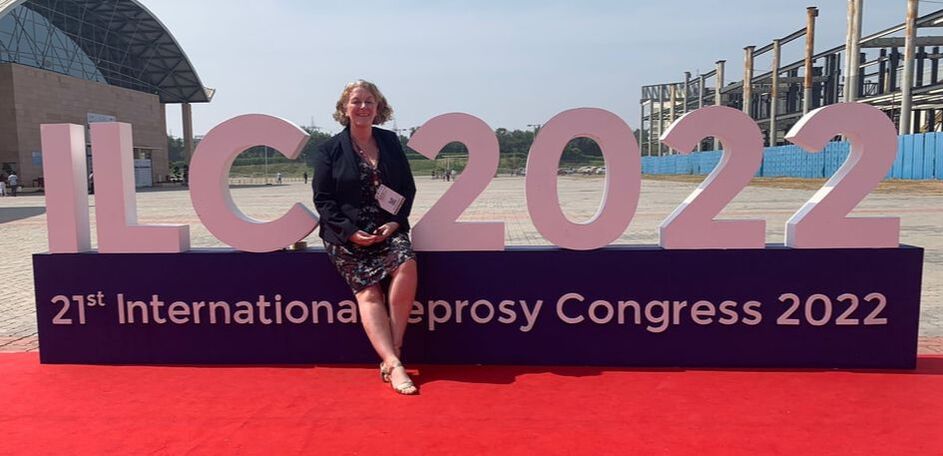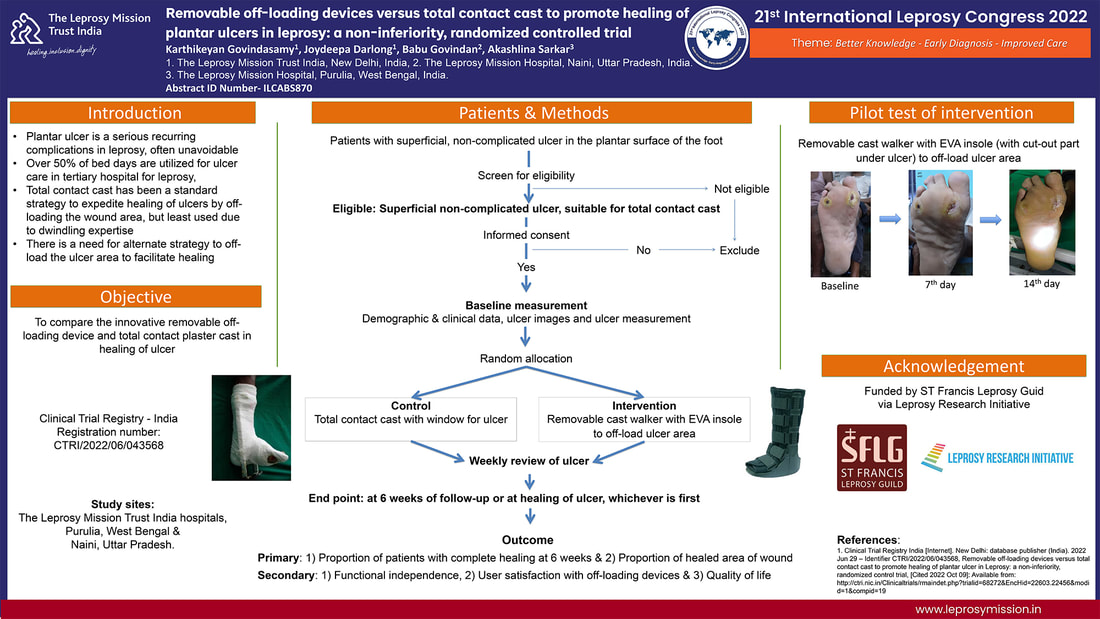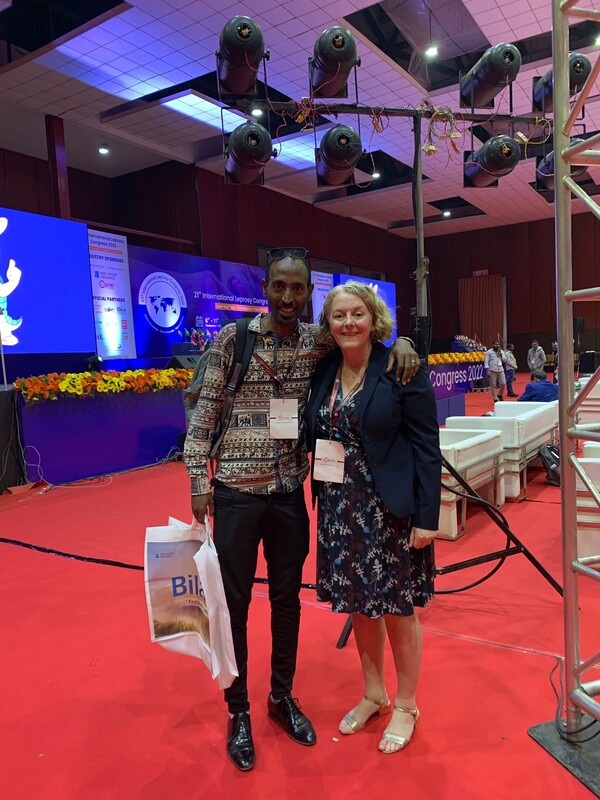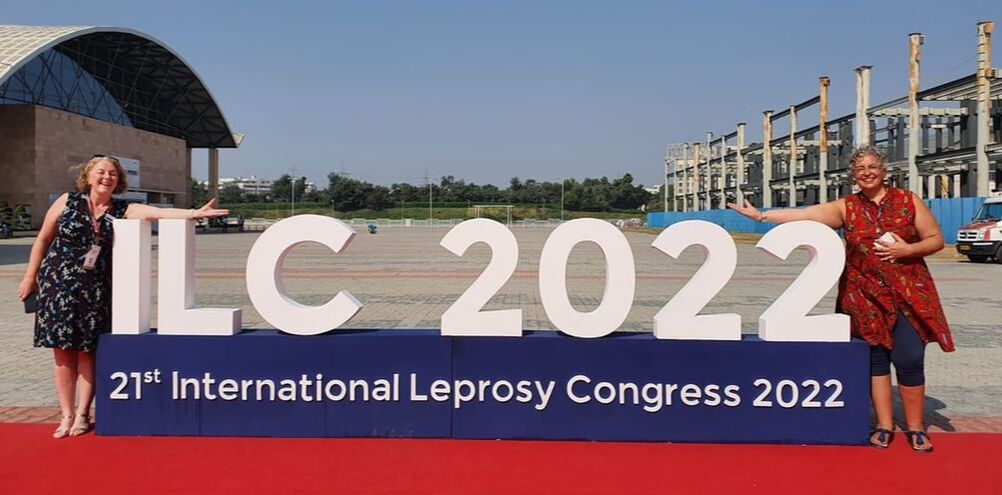NEWS UPDATE
CEO presents promising interim results at 21st International Leprosy Congress
and announces three new studies
and announces three new studies
Hyderabad, 11 November 2022: SFLG's Chief Executive Officer, Clare McIntosh, today presented the interim results of the CIO's programme "Earmarked funding to stimulate population-based Active Case-Finding for leprosy - initial results of an NGO initiative in six areas across four countries." It was a fitting conclusion to the third and final day of the triennial, 21st International Leprosy Congress taking place in the HITEX Exhibition Centre, Hyderabad. Speaking from Hyderabad this morning, Clare said:
I feel privileged to explore how we can best use our funds on behalf of our donors. I feel that SFLG is really on the map now and that other delegates were interested in our ability to work across projects.
I hope that you will enjoy our presentation.
We describe our operational strategy with the word TRACE which stands for Training, Research, Active Case-Finding, Care and Emergency Relief. Arguably the most important element is Active Case-Finding. Actively going out into disadvantaged, endemic locations and communities to find and treat people with leprosy and then tracking down their family, friends and neighbours and checking these important contacts for leprosy too.
Our objective for the first year is to examine or screen 409,000 individuals or most of the residents or members of our target populations where leprosy is endemic, particularly the hard-to-reach communities. Also, as an NGO, to understand more about Active Case-Finding by making observations across a range of studies in different countries.
How do we run this study? We work in partnership with six well-established partners based in four different countries that are endemic for leprosy. Each partner has considerable experience in managing and caring for people with leprosy. We have three studies in India with: New Hope Leprosy Trust, Alert India and Bombay Leprosy Project and three further studies with: The Leprosy Mission Nepal, the Marie Adelaide Leprosy Centre in Pakistan and the Dhanjuri Leprosy Centre in Bangladesh.
Each partner is finding new cases of leprosy by actively examining everyone in a specified target population and at six months, reporting to each country’s national programme and to St Francis Leprosy Guild.
Anyone suspected with leprosy receives an expert examination and diagnosis prior to treatment and then their contacts are followed up."
After the first six months of the programme, 244,287 people were examined. 503 suspected cases of leprosy were found of which
147 were confirmed with leprosy, 12 had Grade 2 or visible disabilities and 15 were children. Across the programme there was a large variation in the rate of suspected cases from 0.08 to 21 per 1,000 people screened.
There are some limitations at this stage. We are looking at preliminary data from the first six months. Some studies took longer to launch than others. We have limited Information on the confirmatory pathway, meaning that we can’t yet explain the differences and variations in data that our partners reported. The epidemiology which deals with the incidence, distribution and control of diseases and other techniques used, vary so the different outcomes need careful interpretation. However, every collaborating centre succeeded in detecting new cases of leprosy."
With modest funding, our partners have undertaken substantial population-based screening for leprosy and new cases were found in every population targeted at a rate of 0.6 cases per 1,000 individuals screened. As a result of these promising interim results, our partners will be awarded year-2 funding and, three new studies will be launched in 2023 in Dinajpur (Bangladesh), Fathimanagar (India), West Nile (Uganda). |
"Removable off-loading devices versus total contact cast to promote healing of plantar ulcers in leprosy: a non-inferiority, randomized controlled trial"
Also presented at the ILC this week by, was a Leprosy Research Initiative project funded by SFLG, and conducted by The Leprosy Mission Trust India. The trial is being carried out in two locations in India at Naini Hospital (Uttar Pradesh) and Purulia Hospital, West Bengal.
Plantar ulcer (leprosy ulcer) is a serious recurring complication in leprosy, often unavoidable. Over 50% of (tertiary) hospital beds for leprosy are needed by people with ulcers.
A total contact cast has been a standard strategy to expedite healing of ulcers by off-loading the wound area, but these casts are seldom used due to dwindling expertise. There is a need for alternate strategy to off-load the ulcer area to facilitate healing.
The objective of the trial was to compare the innovative removable off-loading device and total contact plaster cast in healing of ulcer. To learn more please Download the poster.
Also presented at the ILC this week by, was a Leprosy Research Initiative project funded by SFLG, and conducted by The Leprosy Mission Trust India. The trial is being carried out in two locations in India at Naini Hospital (Uttar Pradesh) and Purulia Hospital, West Bengal.
Plantar ulcer (leprosy ulcer) is a serious recurring complication in leprosy, often unavoidable. Over 50% of (tertiary) hospital beds for leprosy are needed by people with ulcers.
A total contact cast has been a standard strategy to expedite healing of ulcers by off-loading the wound area, but these casts are seldom used due to dwindling expertise. There is a need for alternate strategy to off-load the ulcer area to facilitate healing.
The objective of the trial was to compare the innovative removable off-loading device and total contact plaster cast in healing of ulcer. To learn more please Download the poster.
During the congress, Clare met doctors, both from ALERT Ethiopia, who had been sponsored by SFLG to attend the event.
Most of the delegates at the congress were from South East Asia so I feel really proud that we were able to sponsor two doctors from Africa to attend."
Did you know about leprosy?
For information about leprosy please read our Q&A
For more information please contact:
Katharine Jones
Acting Director
St Francis Leprosy Guild
London W10 6EJ
Tel: +44 (0)7754 592240
Email: [email protected]
Twitter @StLeprosy
Facebook
For information about leprosy please read our Q&A
For more information please contact:
Katharine Jones
Acting Director
St Francis Leprosy Guild
London W10 6EJ
Tel: +44 (0)7754 592240
Email: [email protected]
Twitter @StLeprosy



